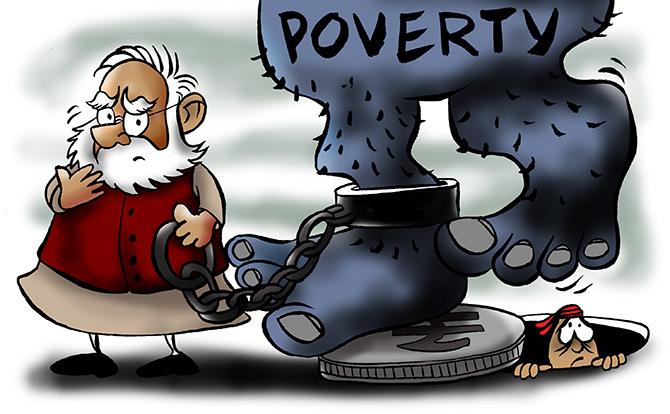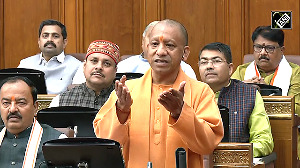There's no silver bullet to get rid of poverty, says Alok Sheel.
Illustration: Uttam Ghosh/Rediff.com

The 2019 Nobel Prize in economics has been jointly awarded to Abhijit Banerjee, Esther Duflo, and Michael Kremer, for 'their experimental work, involving controlled randomised trials.... (which) has considerably improved our ability to fight global poverty.'
'In just two decades, their new experiment-based approach has transformed development economics, which is now a flourishing field of research.'
The focus of their work is on modest, low-cost interventions, derived from experimental field research that demonstrate what interventions work, and what do not.
Whether free distribution of lentils significantly improves attendance at child immunisation clinics, or whether the incidence of malaria declines more when mosquito nets are distributed free, or when they are subsidised, are representative examples of their research.
Their work can give a bigger bang for each buck spent on aid, and government programmes, targeted at the poor.
The claim that their work has transformed development economics, however, needs closer scrutiny, on at least three counts.
First, the 2015 Nobel for economics was awarded to Angus Deaton for similar work in development economics, focussed on poverty, consumption and welfare.
It is by no means clear that experimental random controlled trials are superior to Deaton's methodology relying on detailed observation-based analysis.
Second, there are good philosophical reasons for caution in applying the scientific method used in natural sciences to social sciences.
The physical world is amenable to natural laws in ways that human sciences, such as economics, are not.
It takes a single apple to disprove the theory of gravity.
In human affairs, unlike those of apples, people may react differently in similar circumstances.
There is much in common between the research methodology of Banerjee, Duflo and Kremer and that of the behavioural economists Cass Sunstein, Richard Thaler and Steven Levitt of Freakonomics and Nudge fame.
They use a similar experimental approach, grounded in clinical psychology, to nudge people in desired directions, such as slowing down vehicles outside schools, or reducing urine spillage in men's toilets.
Behavioural economics, however, failed in improving fiscal multipliers during the GFC.
Richard Thaler, awarded the Nobel in 2017, recommended staggering the payout of tax cuts to create the illusion of a permanent increase in income to overcome Ricardian equivalence.
A Federal Reserve study later found that the fiscal multiplier of a single lumpsum check was actually higher.
The credit card and consumption oriented American housewife, and the thrifty Swabian housewife, may respond differently to increases in income on account of cultural differences.
The former was moreover known to shred her credit card during the last financial crisis.
Human responses to the same intervention may thus vary sharply across time and space.
To use an analogy from a popular fable, not only are there both grasshoppers and ants amongst humans, but a grasshopper may well start behaving like an ant in adverse circumstances.
It matters hugely where the randomised trials were done, and when, before they can be successfully applied.
Third, at the macro-level the fastest and quickest way out of poverty is still through higher growth, investment and productive employment on a large scale.
According to World Bank data, there was a sharp fall in extreme poverty (under $1.9 per capita PPP) over the last two decades from nearly 30 per cent to under 10%.
This was also the period when growth in emerging markets and developing economies, where most of the extreme poverty lived, accelerated.
Table 1 shows that the reduction in extreme poverty was much sharper between 1999 and 2015 than between 1981 and 1999.
The sharply differential rates of reduction in China, India and Sub-Saharan Africa can be largely explained by the differential in growth rates.
The much maligned 'trickle down' theory, therefore, contains a solid substratum of truth.

This is also evident in the strong correlation between per capita incomes -- the lagged effect of past growth -- and the incidence of extreme poverty, which stood at 43.9% in low income, 13.9% in lower middle, and just 1.7% and 0.7%, respectively, in upper-middle income and high-income countries in 2015.
Table 2, however, indicates that the evidence for 'trickle down' is stronger for high income and upper-middle income countries than it is for lower-middle income and low-income countries.
Although Vietnam and India are not very far apart in per capita income, extreme poverty in Vietnam is not only far lower, but is also lower than in upper-middle-income Brazil.

Indeed, even low-income Nepal has a lower incidence of extreme poverty than lower-middle-income India.
Such large variations in the incidence of extreme poverty indicate that the linkage between growth/per capita incomes and extreme poverty breaks down in lower-middle income and low-income countries.
Policy interventions, including those of the kind attempted by the Nobel laureates, can make a big difference in such countries.
The focus in high-income and upper-middle income countries shifts from extreme poverty to social poverty and inequality.
While extreme poverty globally declined from 35.9% in 1990 to 10% in 2015, social poverty defined as $5.5 per capita (World Bank) declined far more modestly from 67% to 46%.
Half the world therefore remains poor in the commonsensical meaning of the term.
A rising tide of growth lifts all boats, but unequally.
Since the bar for extreme poverty is low, it falls sharply with sustained levels of high growth and increase in per capita incomes.
Rapid growth, however, has the potential to sharply increase inequality.
Since targeted policy interventions are required in such countries for the alleviation of social poverty and inequality, is there a case for extending the randomised control trial (experimental work) to such countries as well?
The three caveats discussed above in no manner diminish the pioneering work done by Banerjee, Duflo and Kremer.
It is non-trivial, and their recognition as pioneers by the Nobel committee is richly merited.
These caveats have, moreover, been directly or indirectly acknowledged by the researchers themselves.
Such interventions can significantly improve the lives of the poorest, and a case can be made for similar interventions for the social poor, but they do not constitute a silver bullet that can eradicate poverty.
We need to remain circumspect in applying the results of randomised control trials across space and time and continue the focus on macro-level policy interventions that improve the overall environment for rapid growth, investment and productive employment.
Alok Sheel is RBI chair professor in macroeconomics, ICRIER.











 © 2025
© 2025